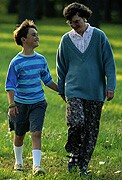
WEDNESDAY, May 19 (HealthDay News) — Parents who engage their young children in conversational give-and-take help their offspring gain a significant leg up in terms of language acquisition, new Dutch research reveals.
The boost to childhood language proficiency appears to be predicated on allowing children to engage in so-called “serious” conversations with their family members — dialogues that permit them to make meaningful contributions to the subject at hand.
The findings are based on the results of a study that tracked 150 Dutch children aged 3 to 6 for a follow-up period of three years. The children were from a mixture of families of Turkish, Moroccan-Berber, and Dutch backgrounds.
Lead researcher Lotte Henrichs noted that as soon as children start school, they are confronted with a need to follow difficult and sometimes abstract concepts, expressed by their teachers through the routine use of complex sentence structures and summed up by the term “academic language.”
By its nature, academic language is part of the normal student-teacher discourse, and has a scientific texture that is typically marked by multiple clauses and conjunctions, Henrichs explained.
The study revealed that parents who encourage their kids to contribute to conversations are preparing their children for gaining a natural proficiency in this particular sort of linguistic skill.
Additionally, parents who read to their children, tell them stories and initiate conversations on interesting subjects also give their kids a head start in being able to acquire the kind of academic language skills they will need throughout their education.
The work was funded by the Dutch Programme Council for Educational Research, part of the Netherlands Organization for Scientific Research, based in Den Haag.
More information
For more on childhood language skills, visit the U.S. National Institutes of Health.

